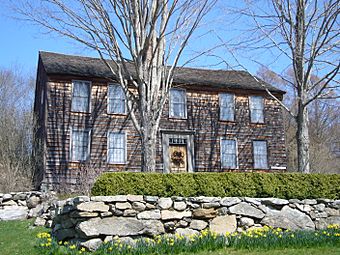Pequotsepos Manor facts for kids
Quick facts for kids |
|
|
Pequotsepos Manor
|
|
 |
|
| Location | 120 Pequotsepos Road, Mystic, Connecticut |
|---|---|
| Area | 9.3 acres (3.8 ha) |
| Built | 1717 |
| NRHP reference No. | 79002650 |
| Added to NRHP | June 15, 1979 |
Pequotsepos Manor, also known as the Denison Homestead, is a very old house in Mystic, Connecticut. It is now a museum where you can learn about history. The house was built way back in 1717. It sits on land that has been owned by the Denison family for a very long time, since 1654!
Today, the Denison Society, which is run by the Denison family, takes care of the house. It was added to the National Register of Historic Places on June 15, 1979, because it is an important historical site.
What Does the Denison Homestead Look Like?
The Denison Homestead is in a quiet, countryside area of eastern Mystic. It's a two-and-a-half-story house made of wood. It has a pointy roof and a big chimney in the middle. The outside is covered with wooden shingles.
The house is built mostly on a rock, so it only has a small basement in one part. The front of the house has five windows and a door right in the middle. The front door itself is from around the year 1800, but it still uses its original metal hinges.
Inside, the house has a special design with the chimney in the center. There's a small entry area with a winding staircase. On each side of the chimney, there are living rooms called parlors. The kitchen is located behind the chimney. Many rooms still have their original wooden floors, which are very wide, some up to two feet across!
A Look at the History of Denison Homestead
The house you see today was built in 1717 by a man named George Denison. He was born in 1690. This was actually the third house built by the Denison family on this land. The land was first given to an older George Denison, who was born in 1620, back in 1654.
The first George Denison built a simple home, and then a larger "great house." Sadly, this second house burned down just before his grandson's wedding. So, the younger George Denison built the new house using some wood that was saved from his grandfather's burned house.
The Denison Society was started in 1930. They took over the Manor in 1941 to preserve its history. In 1946, an architect named J. Frederick Kelly helped restore the house to become a museum. The manor also had more updates and repairs starting in 2006.
See Also
 | George Robert Carruthers |
 | Patricia Bath |
 | Jan Ernst Matzeliger |
 | Alexander Miles |



